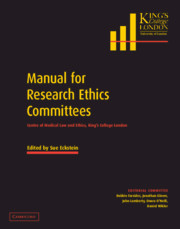Book contents
- Frontmatter
- Contents
- Editorial board
- Acknowledgements
- List of contributors
- Introduction
- Part I
- 1 The ethics of clinical research
- 2 Research ethics committees and the law
- 3 The regulation of medical research: a historical overview
- 4 The regulation of medical research in the UK
- 5 Observational and epidemiological research
- 6 Social survey research
- 7 Approaching qualitative research
- 8 Complementary and alternative medicine: challenges for research ethics committees
- 9 The ethical review of student research in the context of the governance arrangements for research ethics committees
- 10 The ethics of genetic research
- 11 Research or audit?
- 12 Randomised controlled trials
- 13 Determining the study size
- 14 Risk assessment for research participants
- 15 Absorbed radiation in patient and volunteer studies submitted to the ethical committee: a memorandum
- 16 A guide to the use of radioactive materials and radiological procedures for research purposes
- 17 Indemnity in medical research
- 18 The prevention and management of fraud and misconduct: the role of the LREC
- 19 Understanding clinical trials: a model for providing information to potential participants
- 20 The law relating to consent
- 21 Writing information for potential research participants
- 22 The law relating to confidentiality
- 23 Research involving vulnerable participants: some ethical issues
- 24 The ethics of research related to healthcare in developing countries
- Part II
- Index
7 - Approaching qualitative research
Published online by Cambridge University Press: 08 January 2010
- Frontmatter
- Contents
- Editorial board
- Acknowledgements
- List of contributors
- Introduction
- Part I
- 1 The ethics of clinical research
- 2 Research ethics committees and the law
- 3 The regulation of medical research: a historical overview
- 4 The regulation of medical research in the UK
- 5 Observational and epidemiological research
- 6 Social survey research
- 7 Approaching qualitative research
- 8 Complementary and alternative medicine: challenges for research ethics committees
- 9 The ethical review of student research in the context of the governance arrangements for research ethics committees
- 10 The ethics of genetic research
- 11 Research or audit?
- 12 Randomised controlled trials
- 13 Determining the study size
- 14 Risk assessment for research participants
- 15 Absorbed radiation in patient and volunteer studies submitted to the ethical committee: a memorandum
- 16 A guide to the use of radioactive materials and radiological procedures for research purposes
- 17 Indemnity in medical research
- 18 The prevention and management of fraud and misconduct: the role of the LREC
- 19 Understanding clinical trials: a model for providing information to potential participants
- 20 The law relating to consent
- 21 Writing information for potential research participants
- 22 The law relating to confidentiality
- 23 Research involving vulnerable participants: some ethical issues
- 24 The ethics of research related to healthcare in developing countries
- Part II
- Index
Summary
Qualitative research poses a series of challenges for Research Ethics Committees. This chapter elucidates the nature of qualitative research, discusses its appraisal, and rehearses the ethical issues it raises. In the process implications for Research Ethics Committees are indicated. These implications are summarised at the end of the chapter.
Introducing qualitative research
What is qualitative research?
Qualitative research is a label for a family of methods and, just as with quantitative research methods, there are differences and disagreements within the family. However the common denominator of the qualitative approach to social research is a focus on meaning, and on the social world as made up of systems of meaning. For example, one good account of qualitative methods, which highlights their distinctiveness, is that they embody ‘… an approach to the study of the social world which seeks to describe and analyse the culture and behaviour of humans and their groups from the point of view of those being studied.’ (Bryman, 1988, p. 46) It is essential to qualitative research methods that they get ‘inside’ the social world, in particular into the cultures of groups and the subjectivities of individuals. Most qualitative researchers will want to move beyond this ‘first person’ point of view, and to incorporate more theoretical or technical analyses that derive from their disciplinary interests and which help them and us to understand the social world. But they will certainly want to ensure that however abstract or theoretical their work becomes, it some how takes into account, and remains connected to, the cultures and subjectivities of those they are studying.
- Type
- Chapter
- Information
- Manual for Research Ethics CommitteesCentre of Medical Law and Ethics, King's College London, pp. 40 - 48Publisher: Cambridge University PressPrint publication year: 2003
- 1
- Cited by



